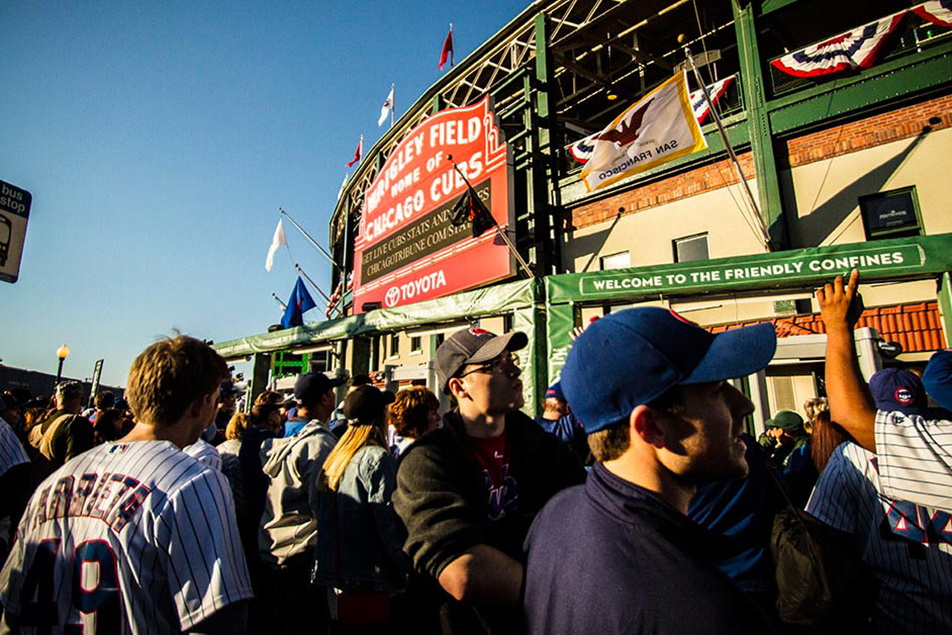
This post was written by Ryne Hastings, Digital Production Specialist and lifelong Chicago Cubs fan.
To say that life as a fan of the infamous “cursed” baseball franchise that resides on the north side of Chicago has caused me both despair and elation would be the understatement of the century. Longer than a century, as a matter of fact. An agonizing 108 years have come and gone without a world title, and a gut-wrenching 45 have passed without so much as a pennant. Despite the disappointment year after painstaking year, fans across the world remain dedicated to the lovable Chicago Cubs. Why would millions of people cheer for a team that has failed to reach the top so many times?
“Sports provide an escape from the drudgery of life,” Elizabeth McGee, PMHNP-BC, FNP, MS, PPG – Psychiatry, said. “It can be exciting and unpredictable, even dangerous, but from a distance. It allows us to be part of the experience without the physical preparation and exertion. We can root for the underdog or gloat over dominance.”
 I should be clear about the origin of my loyalty and devotion. I actually attended my first Cubs game before I was born. My father and expectant mother sat down the first base line on a beautiful afternoon and three months later a new little fan officially entered the world. So, it’s safe to say, cheering for the underdog is in my DNA. But that doesn’t mean it’s always easy. Sometimes it’s downright heartbreaking. Though it’s tough to recall, even their collapse in ’89, I’m quite certain, put my baby brain in a funk. But it turns out this emotional roller coaster might actually be beneficial to my psyche.
I should be clear about the origin of my loyalty and devotion. I actually attended my first Cubs game before I was born. My father and expectant mother sat down the first base line on a beautiful afternoon and three months later a new little fan officially entered the world. So, it’s safe to say, cheering for the underdog is in my DNA. But that doesn’t mean it’s always easy. Sometimes it’s downright heartbreaking. Though it’s tough to recall, even their collapse in ’89, I’m quite certain, put my baby brain in a funk. But it turns out this emotional roller coaster might actually be beneficial to my psyche.
“The highs and lows are like a microcosm of our lives played out rapidly,” Dave Johnson, PhD, CNS, BC, LMFT, employee assistance specialist, said. “I’ve observed the energy, excitement and joy that results from joining a group with the common goal of watching a team beat an opponent. It’s quite magnetic.”
Sports fandom can benefit a person’s mental health in a myriad of ways, according to Elizabeth, even when our team doesn’t get the win. “Coping with loss can be difficult. It can also be an opportunity to learn and improve,” she said. “Babe Ruth said a strikeout was one step closer to a hit. Positive thinking styles can help us cope with losses and disappointments, build mental resiliency and insulate us from depression.” I’ll take a lesson from the Babe any day. He was the Great Bambino and a member of the winningest franchise in sports history, after all.
According to an article published by the University of Utah Health Care, being a sports fan builds a community of like-minded friends, decreasing feelings of loneliness and isolation. “Humans want to belong,” Dr. Johnson said. “Rallying around a common goal sets into motion a setting aside of other values, fears and concerns. For this moment we can have a shared, fun experience.”

Through a series of fortunate events, this lifelong Cubs fan found himself walking down the streets of Chicago at dawn the morning after the recent game one win, clasping tightly to a ticket to the next matchup in the series. As I strolled the streets, I observed strangers high-fiving and yelling commentary and congratulations. I admired the Cubs tributes and eagerly snapped photos to mark the occasion. “The city is a better place to live when the Cubs are winning. People are more generous and treat each other nicer,” said a local resident waiting at a bus stop. “It is a beautiful thing to see.”
That evening at game two of the Division Series, I returned to a seat down the first base line in Wrigley Field, where my lifelong love began all those years ago.
Upon entry into the friendly confines, I thought of the Cubs community and how our loyalty transcends generations. Fans of all ages explored the ballpark with the same wide-eyed sense of wonder I still experience today. A man with his wife and kids shared just how much it meant to him to be a Cubs fan. “I went to my first game here with my entire family when I was a kid. Now I am here with mine at a playoff game,” he said, “This is a special experience we get to share.”
The experience of family togetherness has always been one I could relate to with most of the fans in the ballpark. Up until this evening, I had seen every game for the first 26 years of my life with my father. There has never been a moment in my life where we have not had the Cubs in common. We even had the opportunity to take my 80-plus-year-old grandmother with us, who cheered as loudly as anyone in there. Earlier this season, I was lucky enough to go with my sons to their first game. On this night, I was thrilled to be cheering with my three closest cousins.
We eagerly watched the innings unfold. The first … the second … the third … We had a two-run lead, and then it happened. The ball flew off of relief pitcher Travis Wood’s bat and rocketed into the left field bleachers, causing the park to erupt in joy. And it hit me. I felt the significance of the moment. Not only were we 4 of the 40,000 people in the park witnessing something that hadn’t occurred in 92 years (a relief pitcher hitting a homerun in the post season), but we were living a story we would tell the next generation of Cubs fans, and they would tell the next.
If this is their year, I’ll happily join in the most anticipated celebration of all time. But if it isn’t and that familiar heartbreak finds its way back to me, I’ll still relish the escape of those nine hopeful innings, game after game, season after season. I’ll find happiness in the community of fans who share in the dream. And I’ll always find a spot down the first base line to root for the Cubbies.



